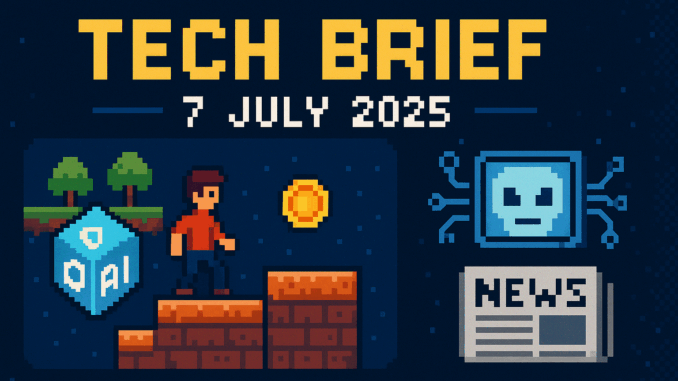
Tech Brief – 7 July 2025 brings stories that’ll make any Gen-X tech lover reach for their soldering iron and question mark key simultaneously. From blockchain gaming’s spectacular belly-flop to AI companies hoovering up content like a Dyson with abandonment issues, today’s roundup proves that some things never change—hype cycles still crash harder than a Windows ME blue screen.
Missed yesterday’s Tech Brief? Catch up here before diving in.
Tech Brief 7 July 2025: Blockchain Gaming’s July Decline Contrasts with Switch 2’s Nostalgic Boom
July 2025 marks blockchain gaming’s spectacular faceplant. Major releases like Mecha Break and EA Sports College Football 26 launched without crypto integration, while studios including Nintendo and Activision Blizzard reportedly confirmed zero blockchain features. Three Xbox games—Armored Warfare and both NASCAR Heat 4/5—will shut servers by August due to licensing issues and player counts lower than a ZX Spectrum’s RAM.
My.com announced Armored Warfare‘s console closure on July 30, citing “unsustainable operations.” That’s corporate speak for “nobody’s playing.” Industry reports suggest blockchain games face shortened lifespans compared to traditional titles, with many struggling to maintain active player bases beyond initial launch periods.
If you’ve ever watched a promising peripheral gather dust (hello, Kinect), you’ll recognise this pattern. Blockchain gaming promised revolutionary ownership but delivered expensive screenshots. The industry’s pivot back to actual gameplay over speculative tech suggests developers finally remembered what made games fun in the first place.
Neverwinter Nights 2 Remaster Revives Classic RPG for Modern Platforms
Aspyr Media’s Neverwinter Nights 2: Enhanced Edition launches July 15 across PC, Xbox Series X/S, PS5, and Switch. The £10M, three-year project delivers 4K textures, rebuilt UI, cross-platform saves, and full controller support. All expansions (Mask of the Betrayer, Storm of Zehir) come bundled, plus restored cut content using original design documents.
The 35GB package (versus the original’s 8GB) includes Steam Workshop and NexusMods integration. Aspyr prioritised modding tools to extend the game’s lifespan—a philosophy that feels refreshingly honest after years of live-service lockdown.
This follows Baldur’s Gate 3‘s reported commercial success proving appetite for proper RPGs still exists. Like finding a working Amiga 500 at a car boot sale, sometimes the classics just need proper restoration to shine again. The remaster demonstrates how preserving gaming history combats industry disposability—something anyone who’s lost saves to server shutdowns can appreciate.
CoreWeave’s $9B Core Scientific Buy Pivots Bitcoin Miners to AI Infrastructure
AI cloud provider CoreWeave acquired bitcoin miner Core Scientific for £7.2B ($9B) in stock. The deal repurposes Core Scientific’s 1.2GW mining facilities across Texas and Georgia for AI training workloads. CoreWeave will retrofit sites with Nvidia H100/H200 GPUs and immersion cooling by Q1 2026, targeting 40 exaflops of compute capacity.
The acquisition capitalises on post-bitcoin-crash asset prices—Core Scientific’s facilities sold at 60% of 2022 valuation. That’s like buying a top-spec Pentium Pro system during the Celeron era. Post-acquisition, CoreWeave projects £3.2B annual revenue from AI services including large-model fine-tuning.
The 1.2-gigawatt power capacity supports extensive GPU installations using single-phase immersion cooling systems offering 40% efficiency gains versus air cooling. This mirrors the 1990s server farm boom when companies repurposed factories for data centres.
Anyone who remembers building early RAID arrays will appreciate the infrastructure complexity here. The transition proves that successful tech pivots often happen in unglamorous warehouses, not Silicon Valley boardrooms.
UK Media Demands Action Against AI “Thieving” of Content
UK media executives testified to Parliament that generative AI firms “systematically steal” content. Evidence included allegedly 2.8M UK news articles scraped without licensing in 2024-2025 by tools like OpenAI’s ChatGPT and Canada’s Cohere. The News Media Association demanded amendments to the Data Use and Access Act (DUAA), proposing mandatory licensing for copyrighted training data and fines up to 10% of global revenue for noncompliance.
The government’s deal with Cohere—currently facing a £2.4B lawsuit from UK publishers—was criticised as “hypocritical.” Ofcom’s new Online Safety Act fees (up to £18M annually for large platforms) add regulatory pressure, with DUAA compliance required by January 2026.
This echoes the 2000s DRM battles when Sony’s rootkit scandal revealed how far companies would go to control content. The difference? AI’s “black box” training makes detection nearly impossible, entrenching Big Tech’s advantage over traditional media. Parliament’s response will determine whether AI development follows fair-use principles or becomes another winner-takes-all platform war.
From the Wayback Machine
On This Day: 1996 – Netscape Navigator 3.0 launched with JavaScript support, frames, and plug-in architecture. The browser wars were heating up, but nobody predicted that within a decade, the web would become the dominant software platform. Today’s AI copyright battles mirror those early internet days when nobody quite knew who owned what in cyberspace, like today’s copyright battles.
What This Means
Tech Brief – 7 July 2025 reveals familiar patterns beneath shiny new surfaces. Blockchain gaming’s collapse follows the classic hype-to-reality arc that claimed everything from 3D TV to motion controls. Meanwhile, infrastructure quietly shifts from crypto mining to AI training, proving that boring engineering often outlasts flashy marketing. The UK’s AI copyright fight suggests we’re finally asking the right questions about who benefits from technological progress.
Sometimes the best tech stories happen when the marketing department isn’t watching—and the lawyers are.

Leave a Reply